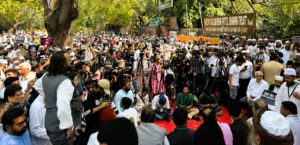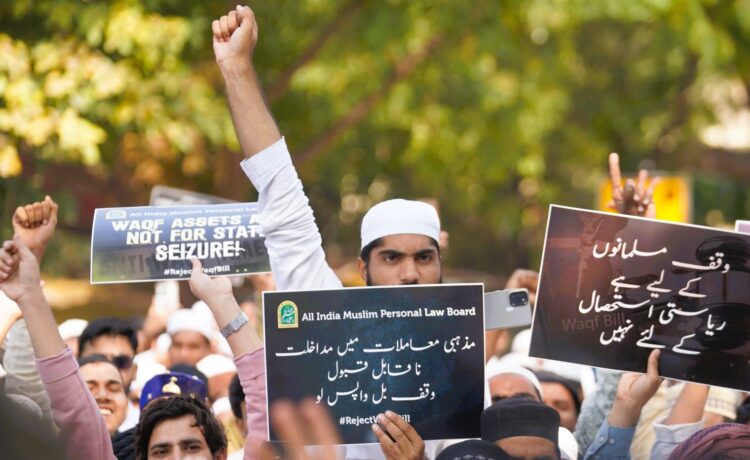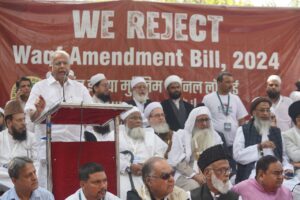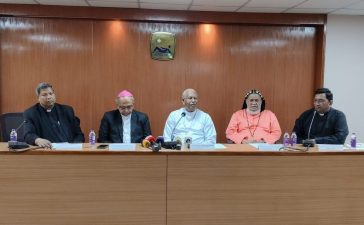Protests Erupt Against Waqf Amendment Bill, AIMPLB Alleges “Attempt to Usurp Muslim Properties”
Muslim organizations and leaders condemn the proposed legislation, calling it a direct attack on religious freedom and property rights.
New Delhi, March 17, 2024: The All India Muslim Personal Law Board (AIMPLB) staged a massive protest at Delhi’s Jantar Mantar today, vehemently opposing the Waqf (Amendment) Bill 2024. The Board has accused the government of attempting to “usurp” Waqf properties, which include mosques, cemeteries, madrasas, and other religious institutions, calling the bill a “direct attack on the Muslim community.”
The protest, initially planned for March 14 but postponed due to the Holi festival, saw participation from various national and state-level Muslim organizations, alongside prominent Muslim leaders. AIMPLB General Secretary Maulana Fazlurrahim Mujaddidi condemned the bill, labeling it a “conspiracy to destroy and usurp Waqf properties.” He revealed that millions of Muslims had emailed the Joint Parliamentary Committee (JPC) expressing their opposition to the proposed amendments.
AIMPLB’s Strong Opposition
The AIMPLB has been vocal in its criticism, submitting detailed written objections to the JPC and engaging with opposition leaders and allies of the ruling BJP. Despite these efforts, the Board alleges that the government has made the bill even more stringent and controversial.
Maulana Fazlurrahim stated, “Through this bill, a sword is hanging over the existence of Muslim mosques, cemeteries, khanqahs, and madrasas. This has forced the Muslim community in India to protest. We want to make it clear to the government that we decided, at the time of independence, to live, die, and be buried in this country with complete religious freedom and Islamic identity. Our mosques will remain, and their minarets will stand tall.”
Political Reactions: A Divided Response
The bill has sparked a heated political debate, with opposition parties and BJP allies expressing contrasting views.
 Congress leader Pramod Tiwari reiterated his party’s opposition to the bill, stating, “When the JPC was formed on Waqf, we had already clarified our position. When this bill is introduced in Parliament, we will clarify our stance there as well. We do not agree with what the BJP wants.”
Congress leader Pramod Tiwari reiterated his party’s opposition to the bill, stating, “When the JPC was formed on Waqf, we had already clarified our position. When this bill is introduced in Parliament, we will clarify our stance there as well. We do not agree with what the BJP wants.”
Shiv Sena (UBT) MP Priyanka Chaturvedi, however, urged caution, saying, “It would be premature to comment on the bill before its introduction in Parliament. The kind of politics being done on it is unfortunate. Our party’s representative, Arvind Sawant, has already presented our views in the committee, and we will continue to do so on appropriate platforms.”
In contrast, senior BJP leader Yogendra Chandolia dismissed the protests as an “insult to the Constitution.” He asserted, “Everything will be done according to B.R. Ambedkar’s Constitution, not according to the AIMPLB. Their leaders should understand this.”
AIMPLB’s Next Steps
The AIMPLB has vowed to continue its fight against the bill, announcing that it will soon reveal an action plan to combat what it calls the “sinister design of the ruling alliance.” The Board has also reached out to key political figures, including Andhra Pradesh Chief Minister Chandrababu Naidu, to garner support against the proposed legislation.
As tensions rise, the Waqf (Amendment) Bill 2024 has become a flashpoint in the ongoing debate over religious freedom and property rights in India. The Muslim community’s resistance underscores the deep-seated concerns over the potential implications of the bill, while the government’s stance remains firm, setting the stage for a contentious parliamentary battle.
The nation watches closely as the debate unfolds, with the future of Waqf properties and the rights of the Muslim community hanging in the balance.
![]()


 edoms. The bill, which aims to amend existing Waqf laws, is seen as a government attempt to exert control over mosques, cemeteries, and madrasas. Despite objections raised before the Joint Parliamentary Committee, the government has reportedly made the bill more stringent, leading to accusations of a “sinister design” against the Muslim community. Political reactions remain divided, with opposition parties condemning the bill and the BJP defending it as constitutional. The issue is set to escalate as the bill heads to Parliament, with the AIMPLB vowing to continue its resistance.
edoms. The bill, which aims to amend existing Waqf laws, is seen as a government attempt to exert control over mosques, cemeteries, and madrasas. Despite objections raised before the Joint Parliamentary Committee, the government has reportedly made the bill more stringent, leading to accusations of a “sinister design” against the Muslim community. Political reactions remain divided, with opposition parties condemning the bill and the BJP defending it as constitutional. The issue is set to escalate as the bill heads to Parliament, with the AIMPLB vowing to continue its resistance.








